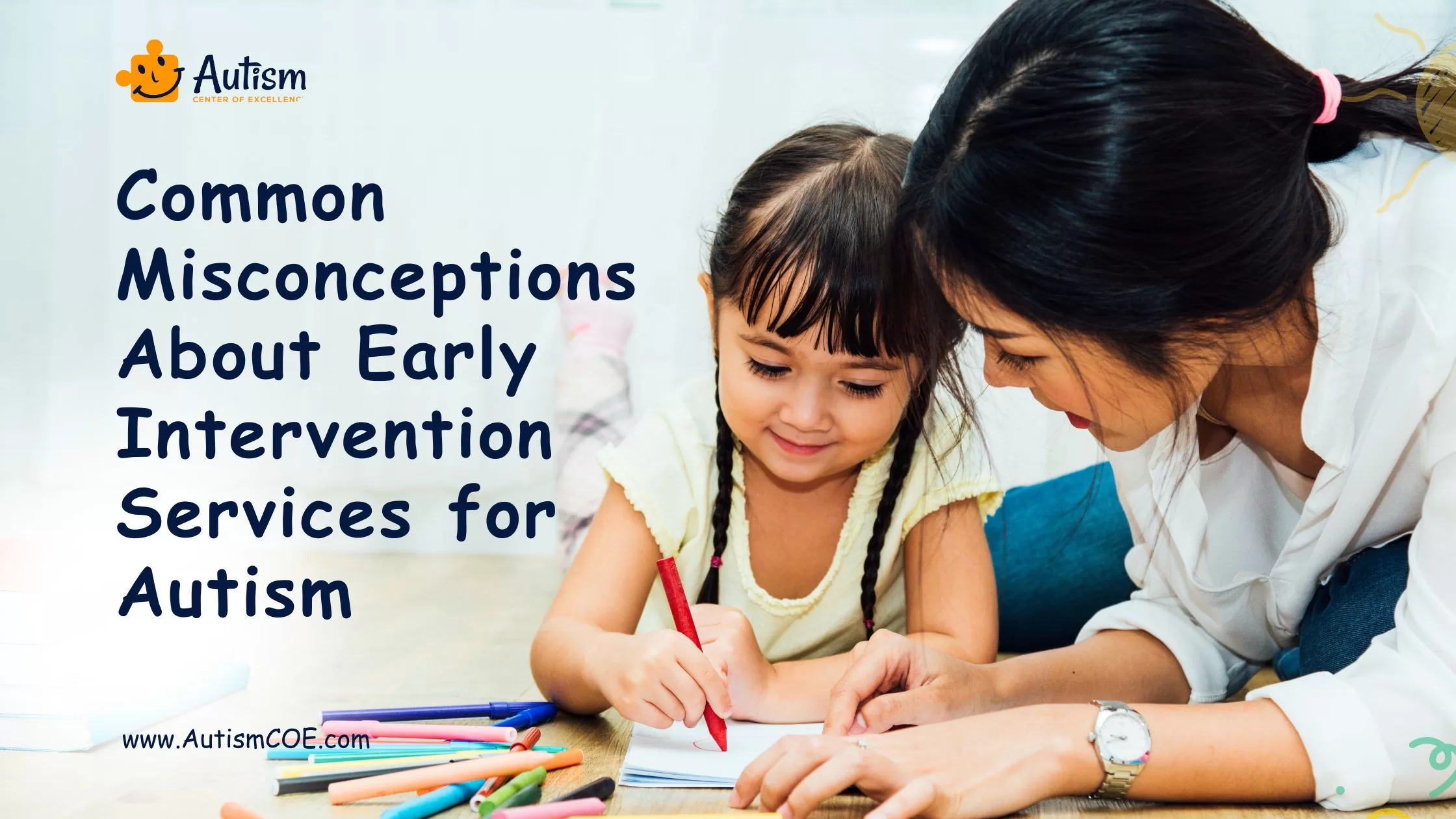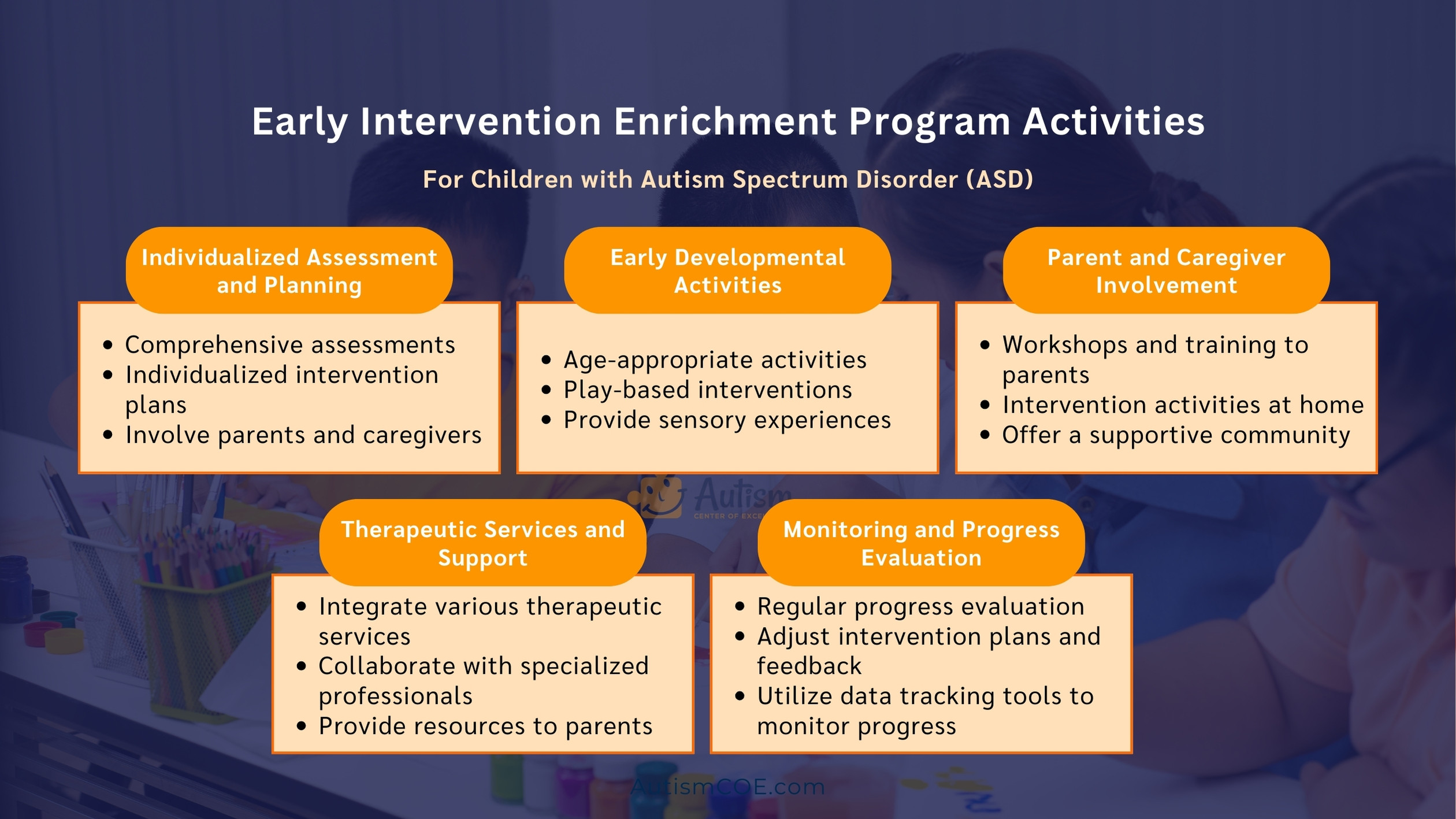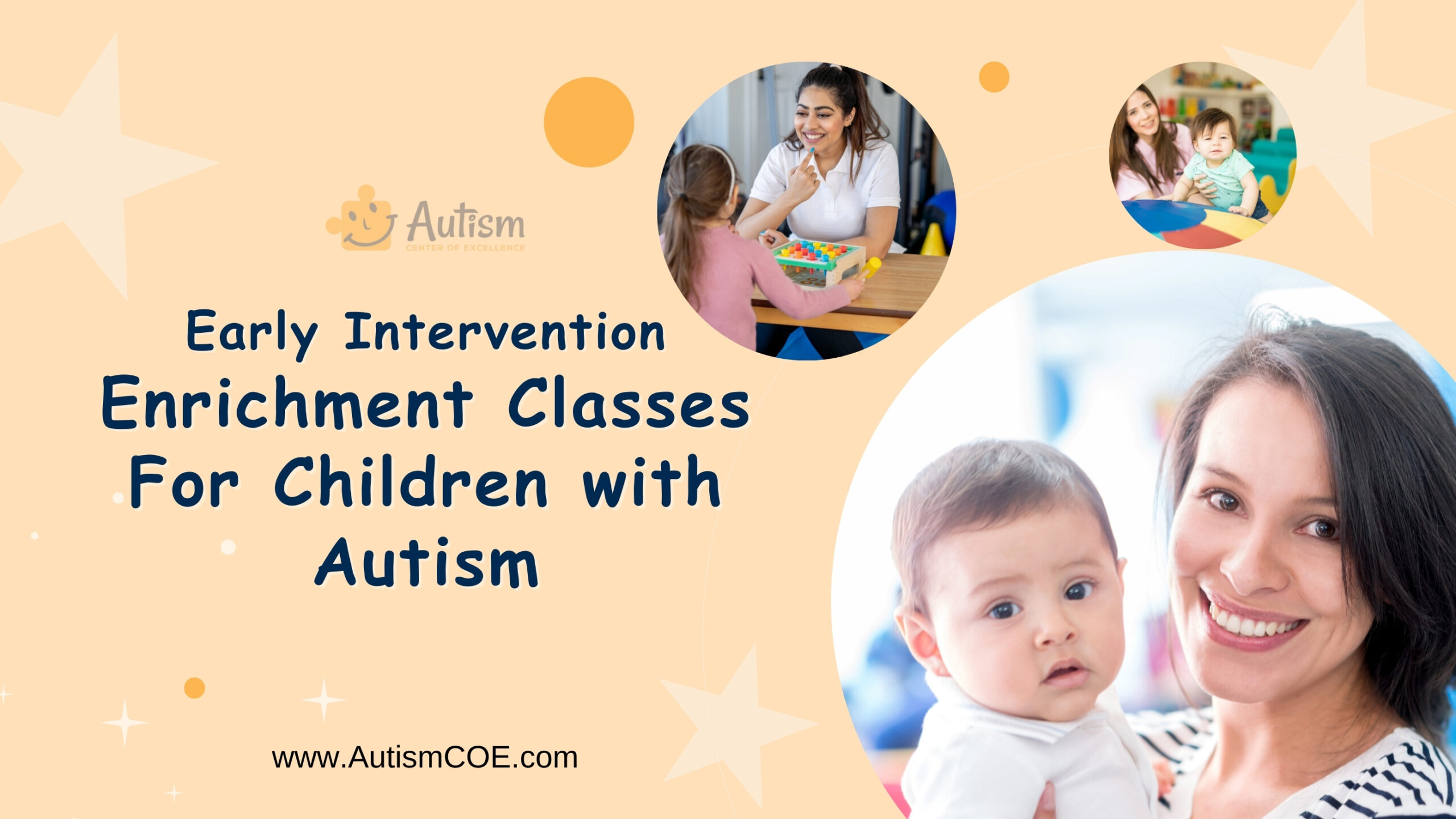Enrichment at the early ages of childhood is not limited to academic learning only. It is not just about creating an atmosphere where its students have a chance to learn and have fun but letting them explore more things and get the most out of their experience. The special lessons that they will learn, can be very effective for children with autism.
The idea of early childhood enrichment exceeds the existing education system because of the supplementary activities provided. Immersed in this approach, a specific child’s holistic development – cognitive, social, emotional, and physical – constitutes its primary aim. In the First & most Effective kind of classes for kids with autism, Early Intervention proves that each child has the ability to become an extraordinary personality overcoming the obstacles on his/her way.
What is the Early Intervention Enrichment Program?
The Early Intervention Enrichment Program is a total system that aims at accelerating the developmental skills of autistic and Developmental Disorders affected children in early childhood. It finds root in the conception that a child’s brain structures are established in the first three years of life: this is where the cognitive, social-emotional and overall physiological development is centered around.
“According to the American Academy of Pediatrics, Early Intervention Services can significantly improve a child’s development. These programs provide therapies and activities specifically tailored to help kids reach their Developmental Milestones.”
It is also worth emphasizing that the earlier these interventions are executed, the better the chances of a child responding well to help. In a study that appeared in the Journal “Pediatrics”, the participants were found to have a higher intelligence quotient (IQ), better language skills, and fewer autistic symptoms than those who were given therapy above the age of 3. On a deeper level, in fact, the major role of Autism Early Intervention Enrichment Programs is not confined to the area of assisting those with autism but involves the quest for improved well-being among these children.
Early Enrichment Program (EEP)
The Early Enrichment Program (EEP) is a specialized program targeted at accelerating the development of children diagnosed with Autism Spectrum Disorder (ASD) and others. The key objective for EEP is the provision of quality and sufficient learning and support to each learner irrespective of their abilities and needs. It adopts an interdisciplinary approach blending different therapeutic treatments and activities to enhance a child’s cognitive, social, and emotional faculties and physical skills.
The program developed by the experts covers various aspects and is mostly presented in a supportive and learning-favoring environment. EEP provides a cutting-edge service to the community as it attributes high priority to the early stage as a perfect window of opportunity for addressing the developmental issues of a child. By developing individualized approaches and providing continuous encouragement, EEP strives to enable those children with autism to unlock their potential, and to have a meaningful as well as fulfilling life.

Common Misconceptions About Early Intervention Services for Autism
Fact: In many cases, initial intervention services are relevant for children with different autism conditions (autism in its most manifest or mildest form, for instance). These services are used to help children with different levels of abilities and stages of development from children with Mild Autism Symptoms to those with severe problems with autism.
Fact: Although Early Intervention Programs do help in organizing the education process, the play, and social interaction are also highlighted similarly. This strategy is the one that is most informed by the fact that the two go parallel – a little bit of structure and a little bit of free play and exploration.
Fact: The early intervention options might be considered tailored to either the learning disability or to the distinctive needs and skills of the child. Others may place more on Speech and Language therapy, but others pay more attention to occupational therapy or even social skills training. Finding a program that answers your child`s individually developed needs is crucial.
Fact: Autism is one of those diseases that are chronic and will not go away even after full treatment. Nevertheless, comprehensive early intervention programs largely contribute to the success of children with development at the same time they ensure their good quality of life. These features enable children with autism to learn key skills, diminish symptoms, and thereby enhance their ability to participate in life as independent persons.
Join Our Weekly Newsletters!
Subscribe now to stay updated with our latest email updates.

Activities in Early Childhood Enrichment Program
Early intervention plays a leading role in understanding what Autism Spectrum Disorder (ASD) is, and this is most true when the topic is the children diagnosed with this developmental disorder. This way, the interventions should come timely and be shaped by the specific characteristics of each child. Providing this, the child can be assisted to have a better development process.
The Core Part of Early Intervention Enrichment Program Activities Are;
1. Individualized Assessment and Planning
- Carry out diagnostic investigations that show the presence of developmental delays or impairments.
- Develop solution-oriented personal intervention therapy based on the results of the assessment.
- Engage parents and caregivers in the planning to make sure the care plan covers the whole picture.
2. Early Developmental Activities
- To accomplish that, we come up with activities that take age-related aspects into account mainly motor development, language issues, and Cognitive Development.
- Apply Play-Based Interventions to make learning fun and exciting for children.
- Create Sensory Environments designed to boost every area of development such as vision, touching, hearing, and smelling.
3. Parent and Caregiver Involvement
- Enrol workshops and Training Sessions to Educate Parents and the caregivers of the children about the development and its effect on their children.
- Promote the involvement in practices tasked at home as a way of reinforcing the lessons.
- Create a supportive environment by arranging parent support groups and establishing networking events.
4. Therapeutic Services and Support
- Incorporate Speech Therapy, occupational therapy, as well as physical therapy, as needed.
- Partner with experts to take care of the concerned developmental dilemmas.
- Continue to offer parents ongoing guidance on the persistent application of the therapies.
5. Monitoring and Progress Evaluation
- Set-up reviewing sessions periodically to observe the emotional and social development of the kid.
- Make fine-tuning the intervention plans during the regular assessments and receiving feedback.
- Use data tracking tools to track progress and share insights with parents and guardians.
We integrate these vital components to create an Early Intervention Enrichment Program that provides children with comprehensive, individualized assistance, which promotes a caring environment conducive to their development.
Why Choose Early Intervention Enrichment Program?
Enrichment programs for Children with Autism Spectrum Disorder (ASD) are critical resources because they provide a number of advantages. It includes a range of support programs.
🚀 Children’s Developmental Needs,
🚀 Primarily Focusing on Communication,
🚀 Social Skills,
🚀 Occupational Therapy, and
Through engaging in enrichment programs at an early age, kids stand a better chance of reducing the symptoms and even enhancing their cognitive capacity to become great individuals. They are involved in boosting the:
🚀 Verbal and Non-Verbal Communication,
🚀 Motor Skills, and
🚀 Ability to Navigate Social Situations.
Another point is that they can engage parents in their development through equipped parenting skills which will help them at home.
Factors to Consider Before Choosing Early Enrichment Program
Among the sets of challenging responsibilities, you may face the difficulty of choosing the most suitable early enrichment programs for your autistic child. Nevertheless, the differentiation of matters may be useful for deciding the right early education class for the kids with autism. Here are some key aspects to consider:
Child's Specific Needs
The child with ASD is unique in every way, while some are strong in certain areas, most of them have different challenges. Identifying the unique needs of your kid is the first thing you should do before enrolling in a suitable program. This will involve finding something they have difficulties with, for example, problems around Social Interaction, Communication, and motor skills, and then choosing a program that will focus on these problems.
Child's Interests
A child usually likes the things that he or she is purposefully involved in and finds some sense of importance or value in those activities. So, for starters, understanding your child’s interests and selecting a program that offers those interests is the first step towards a successful educational experience. Another instance is where your kid likes music and you can try introducing such music therapy programs in that case.
Learning Style
Knowing how your child is likely to learn can be a very big deal in the manner their study-program progresses. Some children could benefit from visual representation while others may understand and remember better through practical activities or auditory directions. Pick an endeavor that fits the brain style of your child.
Take into consideration is it not just to be on a lookout for a program that caters to the needs of your child, but also excites their intellect and engages them with what they want to learn. This will help the child get the best of the Early Enrichment Classes.
Frequently Asked Questions & Answer
What is Early Enrichment?
The word “Early Enrichment” signifies programs or classes that lead to the all-round development of children in all sectors which may include; social, emotional, cognitive as well and physical. By offering these programs, children of all ages will be provided the opportunity to take part in numerous activities that include playing, music, art, language, and math, all these activities seeking to stimulate children’s curiosity and love for learning.
What is the Purpose of Enrichment in Early Childhood?
The aim of early enrichment of children is to ensure that the children receive the additional learning chances, more than just their normal school curriculum. To develop a child’s primary abilities, sensory skills, and artistic thinking, it is designed to cultivate these skills. Enrichment programs in most cases emphasize the individual approach of learning, and students discover and explore what interests them, develop their self-esteem, and enjoy learning.
What is the Right Age to Start Enrichment Classes for Children?
There might be a difference, though, depending on particular requirements of the child and the type of enrichment class. However, many programs are ready to take children of these groups into account as of 2-3 years old. Providing an environment that is in line with the child’s level of readiness is an important consideration for enrichment classes, because such classes have a formal structure. Parents need to determine whether the child meets the required emotional maturity, concentration span, and subscription to particular activities of the program when deciding the time of starting for the child.
What are the Benefits of Early Intervention Services?
A variety of advantages is brought about by early intervention services to children especially those with autism or other developmental disorders. Here are a few key benefits:
- Developmental Progress
- Improved Learning Capabilities
- Better Social Skills
- Family Support
- Future Success
For detailed information please check here –
Unit 3: The Benefits of Early Intervention ABA Therapy for Children With ASD
Conclusion
Teaching toddlers with autism, most of all when it is at the autism enrichment center, has the rightful place in shaping a child’s future. The class imparts a protective environment in which the learners are allowed to experiment with their innermost capabilities, learn new skills, and interact with their classmates. The program guides the child to achieve learning while having fun. This tactic is more likely to help boost the child’s overall growth and development compared to the old way of mass teaching. No matter whether you are looking to Boost Social Interaction, Promote Communication, or Excite Creativity and Problem-Solving Skills, there are great benefits to be seen. Hence, those parents making a deliberate choice to give their children a head start in their lives should give this concept serious thought. These classes not only answer to the individual needs of children with ASD but also it is a start for the children’s growth and life-long learning.
Please Note: The content of this blog is for informational purposes only and should not be considered a substitute for professional medical advice, diagnosis, or treatment. Consult a qualified healthcare professional for personalized guidance tailored to your specific situation.

Bhavika Bhasin
Bhavika Bhasin is the Research and Marketing officer at AutismCOE. She works with children and adults with ASD. Her clinical research includes evaluating various available autism screening and diagnosis methods and their efficacy. She is currently developing a novel screening exam that is indicated to be more accurate than the existing available exams. She is also writes articles papers for various publications.


